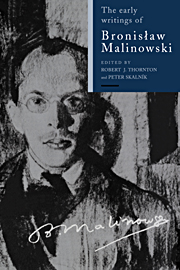Book contents
- Frontmatter
- Contents
- Preface
- Acknowledgements
- Note on the text
- Introduction: Malinowski's reading, writing, 1904–1914
- Malinowski's writings, 1904–1914
- 1 Observations on Friedrich Nietzsche's The Birth of Tragedy (1904/5)
- 2 On the principle of the economy of thought (1906)
- 3 Religion and magic: The Golden Bough (1910)
- 4 Totemism and exogamy (1911–1913)
- 5 Tribal male associations in Australia (1912)
- 6 The economic aspects of the intichiuma ceremonies (1912)
- 7 The relationship of primitive beliefs to the forms of social organization (1913)
- 8 A fundamental problem of religious sociology (1914)
- 9 Sociology of the family (1913–14)
- Notes
- References
- Index
3 - Religion and magic: The Golden Bough (1910)
Published online by Cambridge University Press: 18 December 2009
- Frontmatter
- Contents
- Preface
- Acknowledgements
- Note on the text
- Introduction: Malinowski's reading, writing, 1904–1914
- Malinowski's writings, 1904–1914
- 1 Observations on Friedrich Nietzsche's The Birth of Tragedy (1904/5)
- 2 On the principle of the economy of thought (1906)
- 3 Religion and magic: The Golden Bough (1910)
- 4 Totemism and exogamy (1911–1913)
- 5 Tribal male associations in Australia (1912)
- 6 The economic aspects of the intichiuma ceremonies (1912)
- 7 The relationship of primitive beliefs to the forms of social organization (1913)
- 8 A fundamental problem of religious sociology (1914)
- 9 Sociology of the family (1913–14)
- Notes
- References
- Index
Summary
(1) Frazer's Definition. He proceeds from the definition of magic. It is a worldview approximating the scientific, for it postulates order and uniformity in nature, mainly in the form of two fundamental principles: uniformity and contagion. They may also be formulated as follows: similar things produce a similar effect, and things which have once been in contact with each other continue to be connected so that what happens with one of them also exerts influence on the other. Moreover, on the basis of these two principles and the belief in the efficacy of the rites conducted by it, magic attempts to achieve its aim by man's own power. Religion sees personal deities beyond the forces of nature and ascribes the course of the affairs of the world to their, more or less unrestricted, will. And so it achieves its aims indirectly by appealing to the deities with prayer and sacrifices; religion possesses the institution of priests, churches, worship (The Golden Bough, Pt. I, vol. 1, pp. 52–4 on the principles of magic – they are the fundamental psychological phenomenon of the association of ideas. Chpt. XV, pp. 220–43, magic approximates science. Both are opposed to religion. Three stages: magic alone, magic confused with religion, magic opposed to religion).
Basic criticism. Psychologically magic is something completely different from science because it does not infer ordinary consequences and regularities; it does not perceive in the world of objective things but relates emotionally, subjectively – our superstitions are something completely different from our scientific cognition, although one may be analogous to the other in practice (of course, here the psychological difference between science and superstition applies only to our psychology).
- Type
- Chapter
- Information
- The Early Writings of Bronislaw Malinowski , pp. 117 - 122Publisher: Cambridge University PressPrint publication year: 1993

